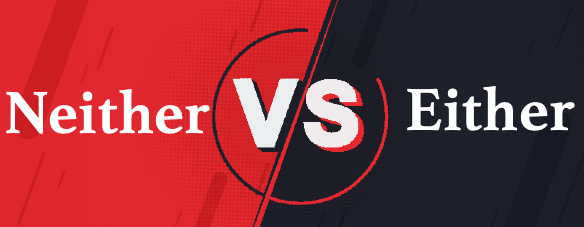Although just one letter makes neither different from either, the words present almost opposite meanings.

Either
Usage of either denotes one of the two actions, things, or persons mentioned in the sentence. For example:
Simple Example 1
Either I will review the project or will supervise the review process.
The above-mentioned sentence conveys that I will perform any one of the actions mentioned in the sentence.
Simple Example 2
Either I will review the project or you will.
This example sentence conveys that one of the persons – I or you – will perform the action of reviewing the project.
Simple Example 3
Tia will purchase either a blue dress or a white one.
This example sentence conveys that Tia will buy a dress that will either be blue or white.
Neither
The word neither is used to denote none of two mentioned actions, persons, or things mentioned in the sentence. For example:
Simple Example 4
Neither will I review the project nor will I supervise the review process.
The above-mentioned sentence conveys that I will not perform any of the actions mentioned in the sentence.
Simple Example 5
Neither I will review the project nor you will.
This example sentence conveys that none of the persons – I or you – will perform the action of reviewing the project.
Simple Example 6
Tia will purchase neither a blur dress nor a white one.
This example sentence conveys that Tia will buy a dress that will neither be blue nor white.
Either vs Neither
The above-mentioned examples make it clear that while usage of either denotes any one of the two mentioned entities, usage of neither denotes none of the two mentioned entities. Hence, one must be careful while using these two expressions.
Takeaways
- Either is used to denote one of the two entities mentioned in the sentence
- Neither is used to denote none of the two entities mentioned in the sentence
Further reading
- Due to vs Because of
- Like vs As
- Since vs From
- If vs When














